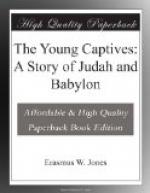It was Esrom’s purpose, as a final atonement, to bequeath one-half of his vast fortune for the development of religious and educational institutions in Jerusalem and to aid the poorer class of Hebrews to acquire homes. The decision of Cyrus the king to assist in rebuilding the Temple at Jerusalem enabled Mathias and his associates to use the bequest in other channels. The fund at their disposal was large, and they were enabled to give a new impetus to the cause of education in Judah. Hundreds of the former captives were likewise assisted in the purchase of land and cattle. Much had been accomplished in the past year for the upbuilding of Jerusalem and the advancement of the race. It was natural, therefore, that, at the close of the ceremonies attending the laying of the foundation of the new temple, Esrom’s friends should let their minds dwell on his generosity. Conversation turned to this theme as the family entered their home.
“It was a gracious and noble thing for Joram to do,” exclaimed Hananiah.
“My uncle frequently told me,” said Perreeza, “that it was his earnest desire to have his native city and his beloved land of Judah take a more advanced position in the affairs of the world. He believed that, with higher educational advantages, the Israelites would rapidly gain in statecraft. They are an industrious people, and many of them have shown such marked administrative ability as to convince observing men that the race will be potent in shaping the destiny of nations.
“Uncle Esrom became the wealthiest man in all Babylon because of his sagacity in barter and exchange. He was wise in regard to what the populace would buy most freely and where to obtain the merchandise to the best advantage.”
“His discretion rather than his wealth gave him influence at the king’s court,” exclaimed Mishael. “Joram was a credit to his people, and methinks he was remarkable for his talent as a diplomat. He had great influence in foreign countries, and his knowledge gained abroad was of the highest importance to Nebuchadnezzar throughout his reign. Our uncle never forgot his native land, and constantly exerted a powerful influence in behalf of the people of Judah. That work was secret and mysterious, however. Frequently we heard of unexpected concessions and favors to our people from the king, and in time found out that they were due to Joram’s promptings.”
“My great hope at present is,” returned Perreeza, “to be spared long enough to see substantial fruit spring from Uncle Esrom’s bounty.”
“I second that hope,” said Hananiah. “I wish to see all the returned captives well provided for. The children of all these families must have doubled advantages as a measure of restitution. We can accomplish much with the immense sum at our disposal.”
“We ought now, under such favorable circumstances,” said Mishael, “to give Israel a new start in commerce and education. We have the benefit of Daniel’s wisdom in this great undertaking; for, on several occasions before we left Babylon, he outlined plans by which Joram’s wishes might be carried out in a practical manner. With the present government of Chaldea to protect our nation, the security of life and property is assured. We can push our projects as hard as we please, and feel confident that nothing but good is being accomplished.”




